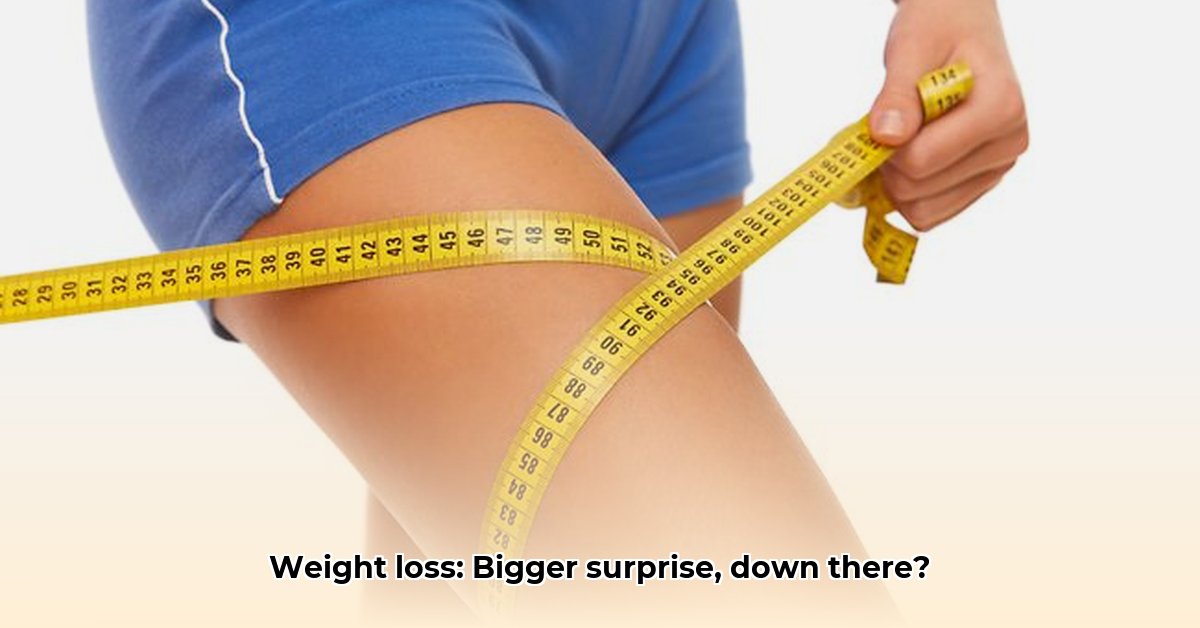
Does Losing Weight Make Your Penis Look Bigger?
Many men wonder if weight loss affects penis size. The simple answer is: it doesn't directly change the actual physical size of the penis. However, weight loss can significantly impact how your penis appears. This is due to the interplay between body fat distribution and the visual perception of penis size.
Losing weight, particularly abdominal fat, can create the illusion of increased penis size. Excess fat around the pubic area can obscure the penis, making it appear smaller. Reducing this fat reveals more of the penis, leading to a perceived increase in size. This is a visual change, not a change in the penis's underlying structure or length.
Think of it like a sculpture buried in sand. The sculpture (your penis) remains the same size, but removing the sand (fat) makes it more prominent. This visual effect can be substantial, leading to a significant change in perceived size.
What we're discussing is the visual impact—the way your penis appears—rather than a change in its anatomical dimensions. Your penis size is primarily determined by genetics and hormonal factors during puberty. Weight loss primarily alters body composition, not the inherent size of your penis.
The Illusion of Size: Visual Perception and Body Composition
It's crucial to differentiate between the actual size of your penis and its perceived size. Excess weight, especially around the abdomen and pubic area, can significantly affect how your penis looks. This excess fat acts as a visual barrier, obscuring the penis and making it appear smaller than it actually is.
Shedding this excess weight, particularly belly fat, can dramatically alter this perception. As the fat diminishes, the penis becomes more visible, therefore appearing larger. This is a result of improved body contouring and the removal of the visual obstruction caused by excess fat. While the underlying anatomical structure remains unchanged, the change in appearance can be significant enough to impact self-esteem and confidence.
This visual effect is often the primary concern for many men considering weight loss. It's essential to manage expectations: weight loss doesn't make the penis physically larger, but it can make it appear so. Understanding this nuance is vital to maintaining a realistic perspective on weight loss and body image.
Beyond Appearance: The Health Benefits of Weight Loss
While weight loss doesn't directly impact penis size, the positive health consequences significantly benefit sexual health and well-being. The advantages extend beyond a mere change in how the penis appears.
Improved Erectile Function: Weight loss often improves blood flow, a crucial factor in achieving and maintaining healthy erections. Obesity can strain the cardiovascular system, hindering blood flow to the penis. Weight loss can alleviate this strain, resulting in stronger, more reliable erections.
Enhanced Libido: Hormonal imbalances associated with obesity can negatively impact libido (sex drive). Weight loss can help regulate these hormones, potentially boosting sexual desire. This hormonal balance contributes significantly towards improved sexual functioning.
Increased Confidence: Improved body image and self-esteem resulting from weight loss positively influence sexual confidence. Feeling good about your body is closely tied to a more positive outlook on your sex life. This increased confidence extends to all aspects of personal life, including sexual health.
These benefits collectively contribute to a more fulfilling and positive sexual experience. The positive impact on overall health and well-being indirectly boosts sexual health, often leading to increased sexual satisfaction.
Debunking Myths About Weight Loss and Penis Size
Several myths surrounding weight loss and penis size need clarification. Let's address some common misconceptions:
- Myth: Losing weight shrinks your penis.
Fact: This is false. Penis size is primarily determined during puberty and remains largely unaffected by weight changes later in life.
Myth: Weight loss significantly decreases testosterone levels.
- Fact: While some studies suggest a potential correlation, more research is needed to establish a direct causal link. Often, weight loss leads to more balanced hormone levels.
It's crucial to rely on accurate information and seek clarification from credible sources to avoid misinformation and unnecessary anxieties.
A Healthy Approach to Weight Loss: Sustainable Changes for Long-Term Success
Achieving sustainable weight loss involves a holistic approach focused on gradual, healthy changes rather than quick fixes. Here's a practical framework:
Consult Your Doctor: Discuss your weight loss goals with your physician, especially if you have any pre-existing health conditions. They can offer personalized guidance and assess any potential risks.
Adopt a Balanced Diet: Focus on a nutrient-rich diet including whole, unprocessed foods such as fruits, vegetables, lean proteins, and whole grains. Minimize sugary drinks and processed foods.
Incorporate Regular Exercise: Aim for at least 150 minutes of moderate-intensity aerobic exercise per week. This could include activities like brisk walking, swimming, or cycling.
Manage Stress Effectively: Stress can negatively impact hormonal balance and weight management. Practice stress-reducing techniques such as meditation, yoga, or spending time in nature.
Remember, sustainable weight loss is a journey, not a sprint. Consistency and gradual progress are key to achieving lasting results.
The Takeaway: A Holistic Perspective on Weight Loss and Sexual Health
While weight loss does not directly alter penis size, it can significantly affect its perceived size due to changes in body composition. The primary benefits of weight loss lie in the improvement of overall health, enhanced sexual function, and increased self-confidence. Prioritize a healthy lifestyle for a holistic improvement in your sexual health and well-being. The focus should be on overall well-being, which inevitably impacts all aspects of your life, including your sex life and your body image.